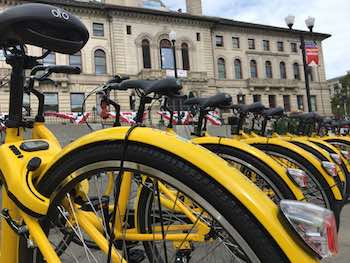Who is a member?
Our members are the local governments of Massachusetts and their elected and appointed leadership.
Mass Innovations, From The Beacon, December 2017

Ofo’s yellow bikes parked in front of Worcester City Hall
In September, Worcester became the second city in the nation to pilot a bicycle-sharing service from a company named Ofo that does not use docking stations.
Bike-sharing programs, such as the Hubway service in Boston, Cambridge, Somerville and Brookline, have become increasingly common in the past few years. Most bike-sharing programs use docking stations, which means users must find and return bicycles at designated locations. Users purchase passes for various lengths of time that allow them to unlock bikes from docking stations.
Ofo, which has since expanded its pilot to Malden, Chelsea and Revere, and similar companies like Motivate and LimeBike, do not use docking stations. (Malden is piloting LimeBike as well.) Instead, users find a GPS-enabled bike using a mobile app, unlock the bike by scanning a code on the bike with their smartphone, ride wherever they like, and then lock the bike again manually wherever they finish their journey, paying for however long they ride (instead of using an hourly or annual pass). Ofo charges $1 per hour for the use of a bike.
Ofo launched its first pilot in Seattle, and now has 400 bikes deployed in Worcester, where the program’s popularity is growing, according to Karen Pelletier, director of higher education and workforce partnershipsPass for the Worcester Chamber of Commerce.
The Chamber of Commerce partnered with City Hall to find a bike sharing program for Worcester. In May 2016, the Chamber of Commerce held a business and government forum that presented three bike-sharing research projects that led to the creation of a task force that met monthly. The task force included representatives from the city manager’s office, the Planning Department, the Health Department, higher education, the Central Massachusetts Regional Planning Commission, and the Worcester Regional Transit Authority.
“What was holding us back, which I’m sure holds back many communities, is the biking infrastructure and the safety component,” Pelletier said. “We’re becoming increasingly bike-friendly, but it’s not a city that necessarily was. That was a barrier – and then definitely funding.”
In May of this year, the task force began soliciting invitations from bike-sharing companies and heard from about seven, including Ofo, which was the only dockless program in the group. Ofo was also the only private company that would not require any public investment or financial contributions.
After a meeting with City Manager Edward Augustus Jr., public meetings were held with stakeholders to address questions such as how the company would maintain its bikes and “rebalance” them (redistribute them so they don’t become available in only a few locations).
Eric Batista, the city’s chief of operations and project management, said constant communication between the city and Ofo was critical to the rollout. The city makes sure that Ofo’s team is notified about damaged bikes or when bikes need to be rebalanced.
“We developed a system where a constituent calls our 311 service, they will log-in the complaints, and then that complaint will automatically send an email to Ofo letting them know,” Batista said. “We encourage constituents to call Ofo directly because the city doesn’t want to be in a situation where we’re handling all complaints and reports.”
He said one hurdle Worcester encountered was the lack of a permitting process for bike-share programs. The city contacted Seattle’s transportation department learn from their experience setting up a comprehensive process.
Ofo’s pilot in Worcester was scheduled to run through the end of November. The city will spend the winter assessing data gathered in the fall to improve the program, which should relaunch in April, Batista said.
He said Worcester is also redrafting a master plan that will include plans for bicycling infrastructure and creating a “bike culture” in the community, and the pilot will provide important data to shape those plans.
“Ofo is going to provide all the ridership data,” Batista said. “We’re hoping this data is going to be valuable for us not only now, but going forward on any decisions made on transportation and infrastructure in the city.”
For more information, contact Eric Batista in the Worcester city manager’s office at (508) 799-1175 or BatistaE@worcesterma.gov.
An earlier version of this story incorrectly identified one of the other dockless bike companies. The name has been corrected in this version.